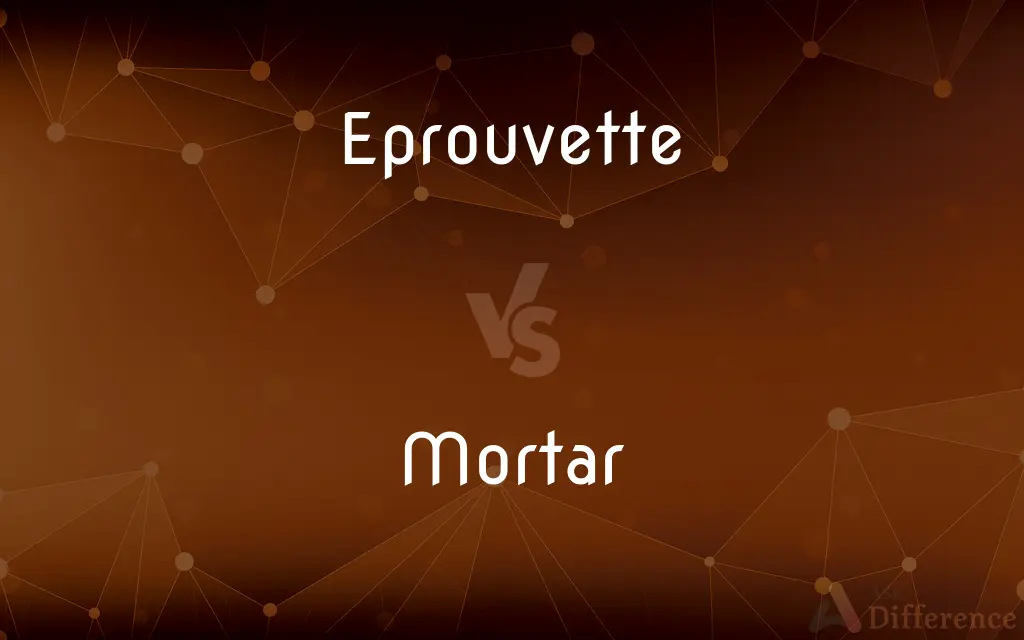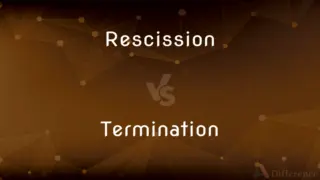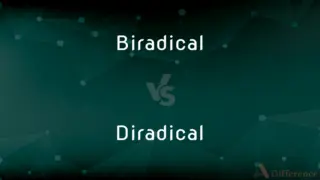Eprouvette vs. Mortar — What's the Difference?
By Tayyaba Rehman & Maham Liaqat — Updated on May 17, 2024
An eprouvette is a small test cannon used to measure gunpowder strength, while a mortar is a short-barreled, indirect-fire weapon used for launching shells at high angles in warfare.

Difference Between Eprouvette and Mortar
Table of Contents
ADVERTISEMENT
Key Differences
An eprouvette is primarily used in the context of testing gunpowder. It is a small, specialized cannon designed to determine the quality and explosive strength of gunpowder. By firing a charge and measuring its power, it ensures that the gunpowder is effective and safe for use. A mortar, on the other hand, is a weapon used in military operations. It is characterized by its short barrel and the ability to launch shells at high trajectories. Mortars are effective in targeting enemy positions that are not in the direct line of sight, such as behind hills or fortifications.
In terms of historical context, the eprouvette was more common in earlier centuries when quality control of gunpowder was critical for military success. Mortars have evolved and remained relevant in contemporary armed forces due to their versatility and effectiveness.
Eprouvettes have largely become obsolete with advancements in technology and new methods of testing explosives. Mortars, conversely, have seen continuous development and integration into modern military arsenals.
Comparison Chart
Primary Use
Testing gunpowder strength
Launching shells in warfare
Design
Small test cannon
Short-barreled indirect-fire weapon
ADVERTISEMENT
Application Context
Quality control in ammunition
Military operations and combat
Historical Relevance
More common in earlier centuries
Continues to be relevant and evolving
Modern Status
Largely obsolete
Actively used in contemporary military
Compare with Definitions
Eprouvette
A small test cannon for measuring gunpowder strength.
The eprouvette was used to ensure the consistency of the gunpowder batch.
Mortar
A device for projecting explosive projectiles in warfare.
Mortars provided crucial support during the siege.
Eprouvette
Instrument for testing explosive materials.
During the 18th century, the eprouvette was crucial for artillery testing.
Mortar
A short-barreled cannon for high-angle fire.
The soldiers set up the mortar to bombard the enemy trench.
Eprouvette
A device used to gauge the quality of propellants.
An eprouvette could determine if the gunpowder would perform well in combat.
Mortar
Indirect-fire weapon for launching shells.
The mortar team adjusted their aim to hit the target behind the hill.
Eprouvette
A tool for evaluating explosive charges.
The laboratory used an eprouvette to assess the new mixture.
Mortar
A short smooth-bore gun for firing shells (technically called bombs) at high angles
Mortars and machine guns
Nine civilians died in a horrific mortar attack
Eprouvette
Historical apparatus for testing gunpowder efficiency.
The museum displayed an old eprouvette used by early chemists.
Mortar
A cup-shaped receptacle in which ingredients are crushed or ground, used in cooking or pharmacy
A pestle and mortar
Eprouvette
As used by ordnance departments and armories, an Eprouvette is a one piece, fixed elevation mortar used to test the strength of gunpowder. It went out of general use by the middle of the 19th century.
Mortar
A mixture of lime with cement, sand, and water, used in building to bond bricks or stones.
Eprouvette
A one-piece, fixed-elevation mortar formerly used to test the strength of gunpowder.
Mortar
Attack or bombard with a mortar
At first light the mortaring and sniping started
The Commando positions were being heavily mortared
Eprouvette
An apparatus for testing or proving the strength of gunpowder.
Mortar
Fix or join using mortar
The pipe can be mortared in place
Mortar
A vessel in which substances are crushed or ground with a pestle.
Mortar
A machine in which materials are ground and blended or crushed.
Mortar
A portable, usually muzzleloading cannon used to fire shells at low velocities, short ranges, and high trajectories.
Mortar
A shell fired by such a cannon.
Mortar
Any of several similar devices, such as one that shoots life lines across a stretch of water.
Mortar
A short, usually stationary, muzzleloading cannon used from the 1700s to early 1900s to fire large round shells at low velocities, short ranges, and high trajectories.
Mortar
Any of various bonding materials used in masonry, surfacing, and plastering, especially a mixture of cement or lime, sand, and water that hardens in place and is used to bind together bricks or stones.
Mortar
To bombard with mortar shells.
Mortar
To plaster or join with mortar.
Mortar
(uncountable) A mixture of lime or cement, sand and water used for bonding building blocks.
Mortar
(countable) A muzzle-loading, indirect fire weapon with a tube length of 10 to 20 calibers and designed to lob shells at very steep trajectories.
Mortar
(countable) A hollow vessel used to pound, crush, rub, grind or mix ingredients with a pestle.
Mortar
(countable) In paper milling, a trough in which material is hammered.
Mortar
(transitive) To use mortar or plaster to join two things together.
Mortar
(transitive) To pound in a mortar.
Mortar
To fire a mortar (weapon).
Mortar
To attack (someone or something) using a mortar (weapon).
The insurgents snuck up close and mortared the base last night.
Mortar
A strong vessel, commonly in form of an inverted bell, in which substances are pounded or rubbed with a pestle.
Mortar
A short piece of ordnance, used for throwing bombs, carcasses, shells, etc., at high angles of elevation, as 45°, and even higher; - so named from its resemblance in shape to the utensil above described.
Mortar
A building material made by mixing lime, cement, or plaster of Paris, with sand, water, and sometimes other materials; - used in masonry for joining stones, bricks, etc., also for plastering, and in other ways.
Mortar
A chamber lamp or light.
Mortar
To plaster or make fast with mortar.
Mortar
A muzzle-loading high-angle gun with a short barrel that fires shells at high elevations for a short range
Mortar
Used as a bond in masonry or for covering a wall
Mortar
A bowl-shaped vessel in which substances can be ground and mixed with a pestle
Mortar
Plaster with mortar;
Mortar the wall
Mortar
A weapon used for lobbing shells over obstacles.
The mortar's trajectory allowed it to clear the defensive walls.
Mortar
Artillery piece designed for steep angle shots.
The mortar was essential for breaking through the fort's defenses.
Common Curiosities
How does an eprouvette work?
An eprouvette works by firing a gunpowder charge and measuring its explosive force.
What is the primary use of a mortar?
A mortar is primarily used to launch shells at high angles in military operations.
What is an eprouvette?
An eprouvette is a small test cannon used to measure the strength of gunpowder.
How does a mortar differ from other artillery?
A mortar differs in its short barrel and ability to fire shells at steep angles.
Is an eprouvette still used today?
Eprouvettes are largely obsolete due to modern testing technologies.
Why was the eprouvette important historically?
It was essential for ensuring the quality and safety of gunpowder.
What types of targets are mortars used against?
Mortars are used against targets behind cover or fortifications.
Can mortars be used for direct fire?
Mortars are primarily designed for indirect fire, not direct fire.
What advancements have replaced eprouvettes?
Modern methods like chemical analysis and automated testing have replaced eprouvettes.
Are mortars still relevant in modern warfare?
Yes, mortars remain a vital part of military arsenals for their versatility.
What materials are tested with an eprouvette?
Eprouvettes were used to test gunpowder and other explosives.
Who invented the eprouvette?
The exact inventor is unclear, but it was widely used in the 17th and 18th centuries.
What is the effective range of a mortar?
The range varies but typically extends several kilometers.
Share Your Discovery

Previous Comparison
Rescission vs. Termination
Next Comparison
Biradical vs. DiradicalAuthor Spotlight
Written by
Tayyaba RehmanTayyaba Rehman is a distinguished writer, currently serving as a primary contributor to askdifference.com. As a researcher in semantics and etymology, Tayyaba's passion for the complexity of languages and their distinctions has found a perfect home on the platform. Tayyaba delves into the intricacies of language, distinguishing between commonly confused words and phrases, thereby providing clarity for readers worldwide.
Co-written by
Maham Liaqat










































